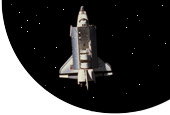Loading |
 |
|
||||||||||||||||||||||||||||||||||||||||||
May 2003 : What could be worth the price of a space shuttle crew? James Oberg Astronomy magazine, May 2003, page 33
Faced with the horror of a high-priced spaceship and seven priceless lives being destroyed over Texas, the question arises - what's this science stuff the Columbia crew was doing that needs such sacrifices? Those of us in the astronomy community - professionals, amateurs, communicators, dabblers - can uniquely answer these questions. We know how to communicate our need to reach for the heavens. We've already been doing this with friends and family who sometimes regard our fascination with the unreachable stars as an idle pastime, a trivial luxury, or a marginal and irrelevant hobby. But it isn't. Not now, and not ever. We know - and need to make the message clear especially in times such as these - that the human fascination with things above the sky has been the forcing function and the engine behind human progress, both technologically and intellectually. Space exploration is the current manifestation of an aeons-old drive to grasp the heavens. Astronomy was for millennia the space exploration of its time. Aside from using the sky as a timekeeper and season predictor, people saw stranger things - such as the Moon and the planets - that made them think about how the sky worked. Curious about predicting celestial motions and the terrifying eclipses of both Sun and Moon, they developed higher mathematics along with better and better calculating technology. And when dogmas embraced by entire civilizations collided with stunning new theories of Earth's place in the universe, knowledge won and dogma lost. It is for the forward-looking energizing forces created by scientific research, and the practical benefits as well, that we explore and tinker and invent. Societies that cling to a static past - the good old days - suffer, both as cultures and as individuals. From the beginning, those human clans that survived and prospered were the explorers. The self-satisfied stay-at-homers went extinct, although we see even during the debates around this tragedy that at least some of their throwback traits reappear during periods of stress and fear. STS-107 was on a mission of exploration - one uniquely suited to the advantages of human curiosity working on the frontier of human knowledge. It was one of the rare flights devoted to research, instead of to the International Space Station. Its mission was to identify scientific avenues appropriate for later exploration aboard the space station. Without construction and maintenance to worry about, the Columbia crew did science in a density that ISS astronauts can't currently achieve. In 16 days, STS-107 scientists accomplished as much research as space station crews can get done in six months. Most of what they did can't be automated - human sensors (eyes) and effectors (fingers) were required. They were at the point-of-the-spear of civilization, and we are proud that there are people like them among our fellow earthlings, and that there are enough people like us willing to support their activities to make human space flight possible. More like them will step forth to take their places, for which we can be prouder. None of this means that we should rashly court danger for its own sake. Nor should we ever accept such losses as inevitable, since often they genuinely are the result of carelessness and oversight rather than the unavoidable hazards of the unknown. As we never forget the hazards of exploration, we also must balance them against the even more terrifying hazards of not exploring. As long as fully informed explorers like those on Columbia are willing to fly to the heavens, we do have a future. |
home | profile | articles | books | lectures | jim speaks | humor
links | email
Copyright 2010 James Oberg. All Rights Reserved
Site Designed and Maintained by YoeYo.com
